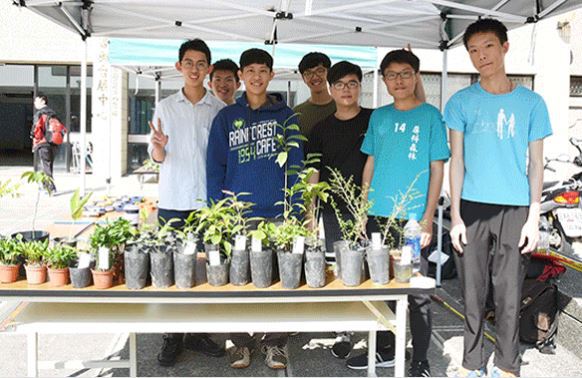Arbor Day, which is named after the Latin word for “tree”, is the annual day for planting trees and this year, the NPUST Department of Forestry brought added attention to it by organizing a week-long educational activity dubbed the “Forest Week”. Each morning at 8:00, from March 12th to 16th, students took their posts at the Forest Week exhibit, showing off a variety of interesting results and information from forest surveys and related research. The goal of the activity was to give outsiders an opportunity to learn more about the woodlands and also see the ways in which the Department of Forestry has been diversifying over the years.President of the Department of Forestry Student Association, Hsu Hui-chun, pointed out that “people often have misconceptions about the type of work that Department of Forestry students go on to do after graduation. Forest Week is providing the public with a better understanding of the Forestry Department, dispelling stereotypes and letting people know that, in addition to the harvesting trees, the Forestry Department also focuses on planting trees and relocating them and on conducting a variety of forest-related research.”Different types of woods, seeds, potted plants, creative crafts, and plant dyeing techniques were included in the exhibits. The students also provided information on the ways in which forest environments are being used for sustainable economic activities including the “under-forest economy” projects that Taiwan is currently developing. Activities falling under this umbrella include bee raising, Chinese medicinal herb cultivation, mushroom cultivation and other economically valuable activities that can be conducted sustainably in forested areas.Department of Forestry director, Mei-Hui Chen said: “the Department of Forestry is cross-discipline in nature; at times we focus on under-forest-economies, environmental education, and eco-tourism, while other times work involves the development of tribal communities. The results of several years of R&D directed at under-forest- economies have already spread to the Labuwan Tribe in Wutai Township, and the chickens they are raising and mushrooms they are cultivating in forested areas are already being sold successfully on the market”.Another member of the Forestry Department Student Association expressed concern, saying: “I often want to do something for our planet. Emissions, pollution, clear cutting and deforestation, problems like these are around us, but we are still students and have little power – no money and no prominence. We must do it ourselves; from reducing plastic use, and using eco-friendly reusable utensils, to planting seedlings – the type of things which are within our power. This is better than doing nothing.”But the forestry students recognize that not everyone knows how to go about planting a tree successfully. Taiwan has a warm climate with lots of rain, and weeds quickly outgrow saplings. Thus, clearing weeds and pruning back branches is essential work that needs to be done to provide seedlings with enough space and sunlight to grow. In order to spread this knowledge, at 3:00 on Arbor Day, a pruning and weed clearing activity was held on campus. The participants were taught how to care for a seedling after it is planted, properly prune the branches, increase the tree’s toughness and increase the chances that it will survive.During forestry week, the Forestry Department Student Association coordinated with the students and faculty of 7 research labs to exhibit research results related to community forestry, forestry education, forest soil microorganisms, forest ecology, forest policy, economics and ecotourism and remote sensing detection and forest measurements to give the outside world a better understanding of what the department is all about.Sustainable forestry is related to the fate of the nation – and the university is doing its part to allow for the better management of resources. By applying LIDAR and drone technology, work is being done to help address the deterioration of forest environments and to carry out “greenification” projects. As it develops such initiatives related to community forestry, under-forest-economies, eco-tourism and environmental education, NPUST is working to combine traditional forestry industries with new forestry industries, thus allowing for natural ecological development and sustainable growth for the future.

